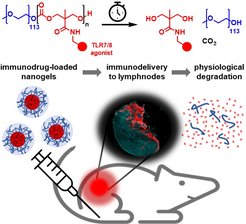Transient Lymph Node Immune Activation by Hydrolysable Polycarbonate Nanogels
Preventing the accumulation of nanocarriers is of high importance to promote nanomedicines and enable their application, for instance, in immunodrug delivery. In this paper, polycarbonate-based nanogels are introduced as promising gradually hydrolyzing carrier system that allow a transient delivery of immune stimulatory cues into lymph nodes.

The development of controlled biodegradable materials is of fundamental importance in immunodrug delivery to spatiotemporally control immune stimulation but avoid systemic inflammatory side effects. Based on this, the Emmy Noether Research Group of Lutz Nuhn has developed polycarbonate nanogels as degradable micellar carriers for transient immunoactivation of lymph nodes. An imidazoquinoline-type TLR7/8 agonist was covalently conjugated via reactive ester chemistry to the carriers. Due to the hydrolysable nature of the polymer backbone the resulting polycarbonate nanogels demonstrate a gradual disintegration within several days under physiological conditions (PBS, pH 6.4–7.4, 37 °C). Such intrinsic properties limit the carriers lifetime and, thus, circumvent unforeseen nanoparticule toxicities while the payload can still be successfully leveraged for immunological studies in vitro as well as in vitro. For the latter, a spatiotemporal control of immune cell activation in the draining lymph node was found after subcutaneous injection.
Overall, these features render polycarbonate nanogels as promising delivery system for transient activation of the immune system and may consequently become attractive for further development toward vaccination or cancer immunotherapy. Moreover, the intrinsic biodegradability combined with the high chemical control during the manufacturing process may be of great importance for further translation, too.












